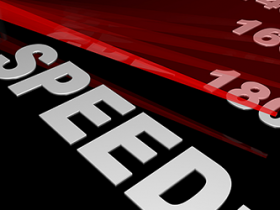Bought yourself quite a high-performance Windows laptop or PC, and after a few months you find yourself missing how zippy it once was? It could be that your laptop or Windows PC is slow because it’s simply overloaded, but that’s just one possibility.
Read on to learn the various reasons why your laptop is becoming slower and slower — and how you can breathe new life into it quickly, safely, and easily with a laptop speed-up.
Reasons why your PC’s slow
You guessed it: You can rarely blame your hardware for causing your laptop to lose speed over time. However, there are many reasons why PCs actually become slower and slower over the course of their life.
Too many videos and photos often saved in various formats, temporary files, unnecessary programs and apps, your internet browser’s cache, unnecessary Windows services, and even dust can cause your laptop or PC to suffer a drop in performance or speed. And although each individual factor may not be the sole reason why your PC is slowing down, these effects build up — something you shouldn’t underestimate.
To prevent this from happening, giving your laptop a regular and thorough laptop speed-up is extremely useful if you want to liven up your laptop. And alongside enjoying improved performance, you also address security issues at the same time.
Laptop speed-up: Quick wins for better performance
As mentioned, you shouldn’t underestimate the cumulative effects that cause your laptop to slow down. Nevertheless, some steps can already give you a quick win, by which we mean you’ll be quick to notice an improvement in the speed of your Windows PC or laptop.
And even if this first top tip may sound uninspiring, it’s worth including your laptop or PC when you go around your home giving it a dust down. That’s because when they’re running, computers are like dust magnets — especially the fan that magically sucks in dust. Your computer needs a good flow of air — and if it’s restricted, this can cause overheating which in turn results in a drop in speed.
Before speeding up your laptop, create a backup!
Prior to performing any of the following steps, we strongly recommend you back up your system in full. That way, if anything goes wrong you can still revert back to a previous state.
It’s easy to back up your computer’s hard drive using Windows 10 or 11’s built-in backup tool. Simply open the Start menu and type Control Panel. Open Back up and Restore, then click Create a system image on the left. Now just choose where you want to save the backup — such as an external drive or using a cloud service. Once started, the actual back-up process will take anywhere from several minutes to a few hours depending on how much data you need to back up.
It’s also really easy to back up your system using Avira System Speedup Pro. It’s a great alternative to other tools because it provides you with additional features and services to manage and secure your Windows laptop or PC.
Clear speed-up gain: Uninstall unnecessary apps and programs
Unfortunately, Windows doesn’t routinely keep you informed about whether your laptop or PC might be overloaded. And apart from the fact that Windows comes pre-installed with a number of additional and often superfluous apps anyway, you usually only find that you need to act when something seriously slows down your system.
Many of these pre-installed (and often unnecessary) apps slow down your laptop or PC because of processes running unnoticed in the background — reason enough to take a close look and uninstall unnecessary apps and programs.
In addition to Windows’ built-in solution, you can get various free tools to completely uninstall unneeded apps and programs.
The free version of Avira System Speedup also helps you uninstall unnecessary apps and programs. It also offers additional features to help you track down duplicate files as well as dummy and extremely large files that slow down your laptop.
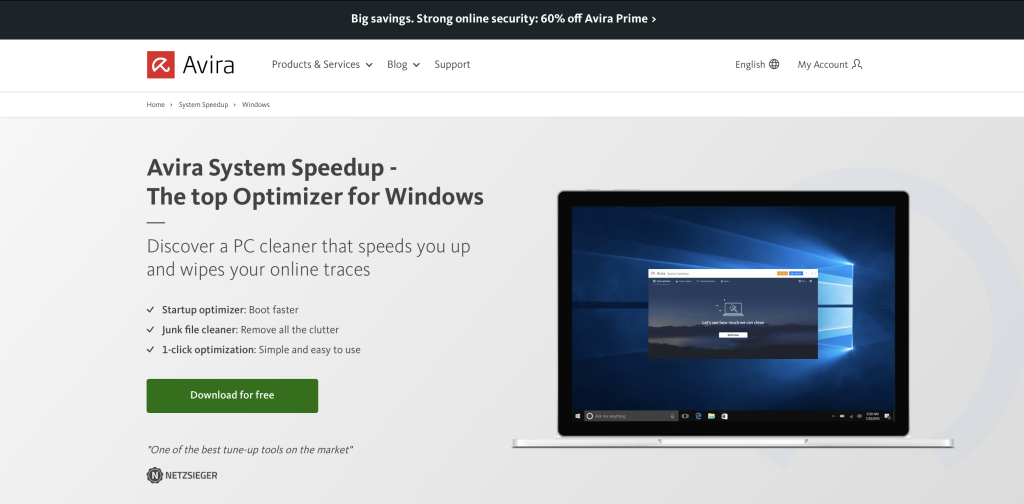
Make your PC faster: Delete temporary files and clean up the registry
After deleting programs that you no longer need, registry entries usually remain on the hard disk even after you restart your device. With the free Avira Junk Cleaner tool, you can delete every last remaining registry entry belonging to programs you’ve uninstalled — and inject new life into your Windows laptop or PC.
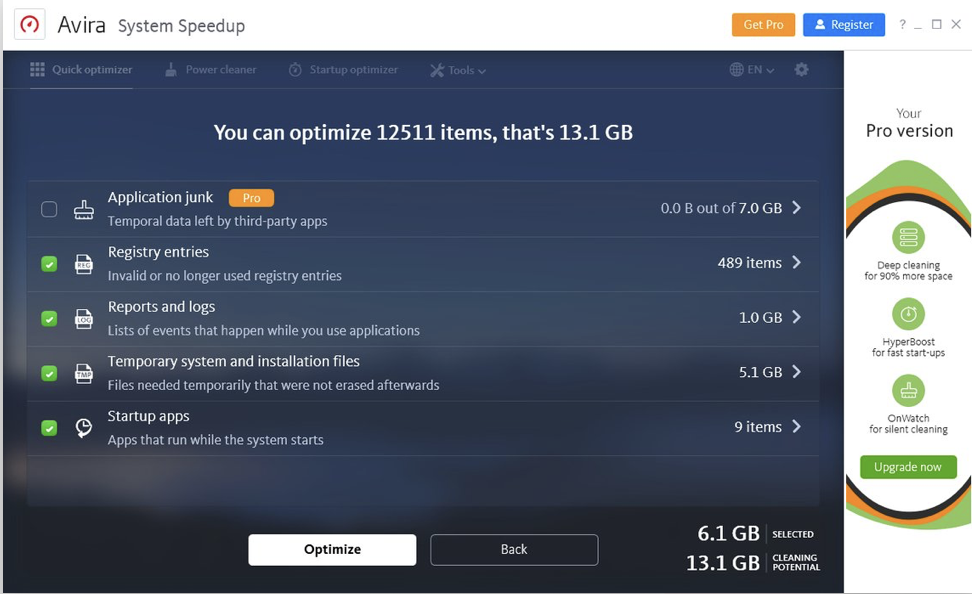
When your laptop gets slower and slower: Defragment your hard drive
Over time, thousands of different files stored in the background end up on your laptop in a disorganized mess on your hard drive, leaving it looking like a bargain bin. When you defragment your hard drive, you bring order to the system — bringing lasting improvements to the speed of your laptop or PC. This is what you need to do:
- Open Windows Explorer by pressing the Windows key and E simultaneously. Select This PC on the left.
- Scroll down to Devices and drives on the right. Right-click the drive you want to defragment and click Properties.

- In the window that opens, click the Tools tab and then Optimize.

- You will see all available partitions as well as the degree of fragmentation in percent on the right.
- Select the desired drive and finally click Optimize. Depending on the size of this drive, the process may take a few minutes to a few hours.

Top tip: You can auto-optimize your laptop’s hard drive. In our example we’ve chosen the setting Weekly.
Laptop speed-up: Check and disable startup programs
Many people start their working day in the office by starting their PC or laptop, knowing full well that it’ll take quite a while to get up and running. This gives them plenty of time to go grab a coffee from the kitchen or greet colleagues.
It’s not a routine you want to keep at home, because there you want your laptop to start as quickly as possible. If you still have to wait too long, it’s probably because some installed programs or apps start automatically with your computer, eating up resources that then slow down your laptop. You can additionally optimize your laptop’s performance by turning off the ability of non-essential apps and programs to start up with Windows.
The quickest way to choose which programs you want, or don’t want, to start automatically with your laptop takes just a few steps: Press the CTRL + ALT + Delete keys and open Task Manager.
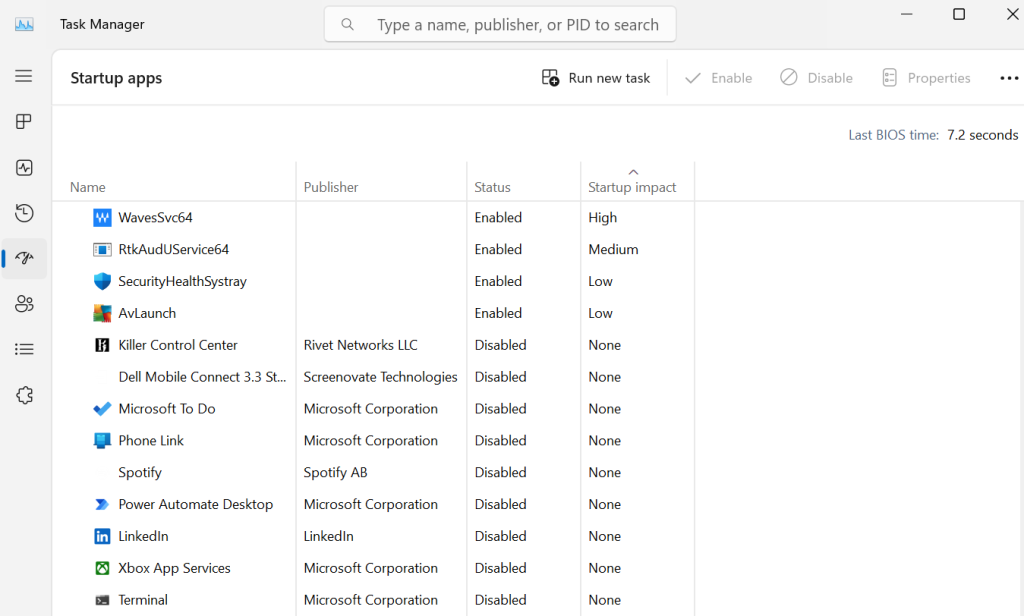
For a clear performance bump, under the Startup tab you can choose which programs you want to start up, and which ones you don’t, when you start your computer.
Top tip: The Startup impact column gives you a good idea of what kind of impact a particular program has on your Windows laptop or PC’s start time. Can’t see the column? It’s easy to display it: Simply right-click the status row, then select the information you need from the context menu.
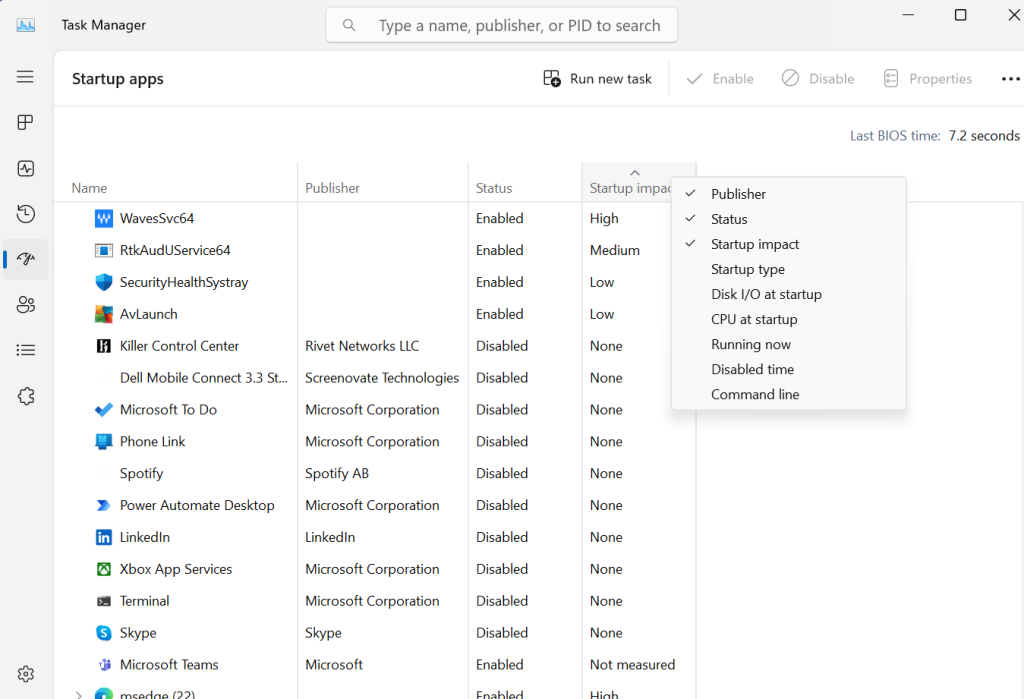
Quick win: Disable running and unnecessary services
Installed programs, apps, as well as a considerable number of Windows functions run through services — including those that simply slow down your laptop or PC.
- If you press the Windows key and R simultaneously, the Run window will open.
- Enter msconfig there and confirm with OK. The System Configuration window will then open.
- If you now click the Services tab, you’ll see a list of all the programs and their associated services that start with Windows. If you click the Hide all Microsoft services option, only the services of the programs and apps you have installed will be listed.
- Now you can simply remove the tick in front of the service you want to disable. Save your changes by clicking OK. These now deselected services will no longer be activated the next time you start your laptop or PC, meaning you’ll have taken another step towards making your laptop or PC faster.
Hint: Only disable the services you can clearly assign to programs. Services such as Bonjour, for instance, belong to iTunes, which won’t start without this service.
Clear the cache for a faster laptop
All browsers store certain elements (such as images) of the websites you visit in a place that isn’t visible to us users — the cache. Over time, enormous amounts of data accumulate there, slowing down your laptop or PC.
The fastest way to clear the cache is to use shortcuts (simple key combinations). Just be sure to briefly press the following keys simultaneously:
- Chrome: Press CTRL + F5 or SHIFT + F5.
- Firefox: Hit CTRL + F5.
- Safari (Windows): Hold down CTRL + R.
- Opera: Press CTRL + F5 (to clear browsing data) or CTRL + R (to hard-refresh and clear the cache for a specific page).
- Microsoft Edge: Hit CTRL + F5.
Top tip: Having lots of browser tabs open at the same time can seriously eat into your laptop or PC’s performance since they strain system resources unnecessarily. As such, be sure never to keep too many open.
Keep your drivers up to date for a speed boost
Every system component, program, and app on your laptop or PC needs a driver to communicate with the Windows operating system. If the drivers are outdated, they may not be able to communicate properly with the other instances through the operating system. On the flip side, if your drivers are up to date, this can help speed up your laptop.
- Press the Windows key and R simultaneously to open the Run window.
- Enter devmgmt.msc and confirm with OK to open Device Manager.

- Right-click the component whose driver you want to check and update, then select Update driver from the context menu.

- In the new window that opens, click Search automatically for drivers. Windows will then start searching for the latest drivers. If a driver that needs to be updated is found, you can now install it. If not, simply close the window.

With Avira Antivirus Pro you have a powerhouse that scans your laptop or PC for any driver updates and can also take care of updating them for you.
Regularly restarting your laptop can make it faster
Leaving your laptop in stand-by mode all the time, i.e. switched on, is very convenient, but it consumes a lot of memory resources — and slows down your PC or laptop.
If you regularly switch off or restart your laptop, this will end programs and services running in the background, plus clear the memory cache and at the same time trigger updates and patches that require a restart.
Comprehensive virus protection is something no Windows laptop or PC should be without
We probably don’t need to tell you that even unnoticed active malware, viruses, and ransomware can slow down your laptop or PC. That’s why comprehensive virus protection is something no Windows computer should be without. And it’s all the more important given the hundreds of thousands of emerging online threats confronting our PCs and laptops.
Even the free version of Avira System Speedup provides you with an all-you-need cleaning tool that speeds up your PC and protects it from malware threats.
This tool can also help you remove junk files and speed up your computer’s start time thanks to its integrated junk file cleaner.
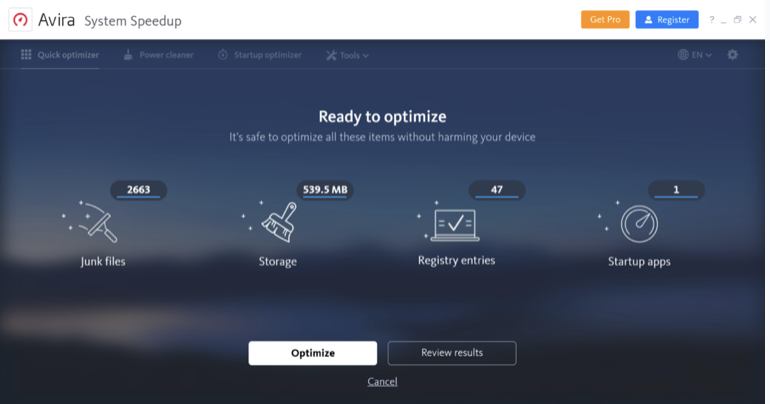
If all else fails, it’s time to reinstall the operating system
If you’ve been using your laptop for a few years, the steps we’ve mentioned to speed it up may not work that well. But all hope is not lost! There remains one course of action open to you: A complete reinstallation of Windows. Although your PC will be reset back to its factory settings and all its apps and settings will be deleted, you can still keep your personal files if you want. Simply follow these steps:
- Open the Start menu and select Settings.
- Click Update & Security, then select Recovery. Now click Get started under Reset this PC.
- You can now choose to keep your files when you reset your PC or remove everything.
- Once started, the process may take several minutes during which time you should not touch your computer.
Speed up your laptop with an external hard drive
If you load up your car to bursting point, it’ll slow down — and the same goes for your laptop or PC. So, take care not to fill your hard drive to the brim with data. If you’ve got less than 10 GB of memory spare, this will slow down your hard drive’s read and write speed enormously.
If you’ve got lots of space-consuming documents, videos, or pictures to store, it’s a good option to use an external hard drive.
Perk up your laptop or PC’s performance with an SD card
Instead of an external hard drive, an SD card can be a great solution if you need a lot of storage space, such as for data-hungry graphics programs. You can even just leave the SD card in the reader slot for use as extra RAM memory, although the effect achieved by cheaper SD cards won’t be as significant. If you use a 256 GB memory card, you’ll be getting a speed class 3 (U3) model. These types offer significantly faster data transfer speeds.
Make your laptop faster with an SSD drive
An SSD (solid state drive) can give your PC and laptop an enormous performance boost, plus you can use it as an internal or external storage device. Compared to the HDD (hard disk drive) in many computers, with an SSD you benefit from short loading and storage times thanks to flash technology — meaning you can squeeze every last drop of performance out of your laptop without suffering any drops in performance, making it significantly faster.
In addition to speed, SSDs consume less power and are more compact — they’re also quieter than HDDs.
However, if you only want to back up your data, an HDD is still a good choice. That said, if you’re a passionate gamer, graphic artist, or video editor and therefore value impressive speed and silent operation, an SSD is the better but more expensive option to go for.













